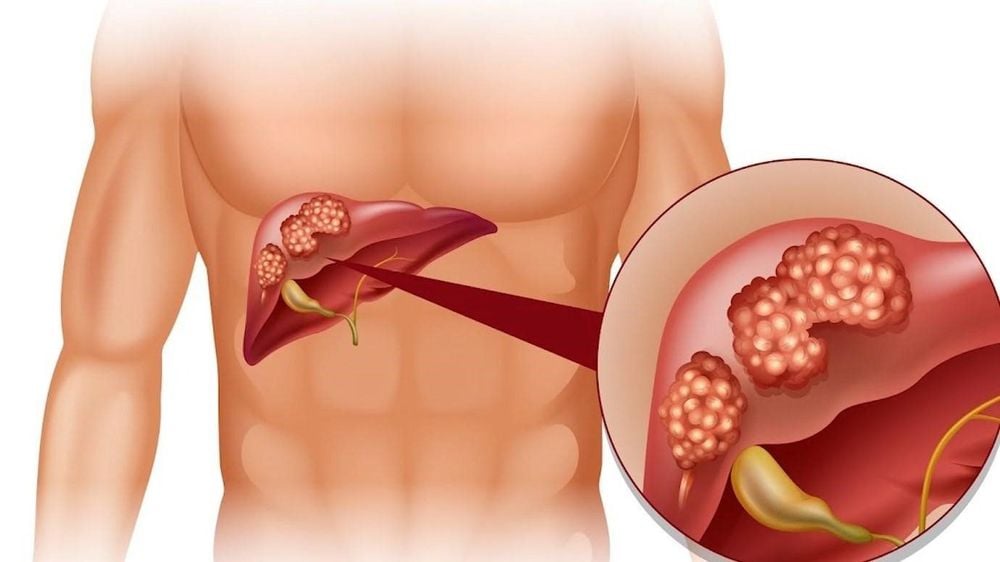This is an automatically translated article.
The article was professionally consulted by Specialist Doctor I Le Nguyen Hong Tram - Gastroenterologist - Department of Medical Examination & Internal Medicine - Vinmec Nha Trang International General Hospital. The doctor has many years of experience in the examination and treatment of gastrointestinal diseases, especially gastrointestinal - hepatobiliary diseases, gastrointestinal endoscopy and general internal diseases.The liver is a very important organ to keep the body healthy. The liver's function is to metabolize nutrients, purify toxins, and turn food into energy. There are a number of liver diseases that cause this organ to not function properly and affect your entire body.
1. Hepatitis due to infection
Infections that can cause hepatitis, with viral hepatitis being the most common cause, include the following:Hepatitis A Most cases of hepatitis A are caused by eating or drinking food. contaminated with bacteria present in the patient's stool. The disease usually doesn't have any symptoms and will go away on its own within 6 months with no lasting harm.
Hepatitis B This disease is transmitted from person to person, such as through unprotected sex or sharing needles. If hepatitis B persists for more than 6 months, the patient is more likely to develop liver cancer or other dangerous liver diseases.
Hepatitis C is spread by the blood of an infected person entering the blood of a normal person. So you can get hepatitis C if you share needles with other people or have HIV. Healthcare workers are at risk of contracting hepatitis C if they accidentally insert an infected needle into a person. However, symptoms may not appear for many years. Although the cause is unknown, people who were born during the Baby Boom period (from 1946 to 1964) are more at risk for hepatitis C and should be tested.

2. Immune system problem
The immune system is responsible for fighting against "invaders", including bacteria and viruses. But when the immune system fails, it misbehaves and attacks one or more parts of the body, such as the liver. Immune-related liver diseases include:Autoimmune hepatitis : Causes inflammation of the liver and can lead to other liver diseases, even liver failure. This condition is more common in women than in men; Primary cholestatic cirrhosis: The small bile ducts in the liver, which contain chemicals that help digest food, are attacked. When the ducts are damaged, bile stays inside the liver and creates a scar. Women will experience this condition more often than men; Primary sclerosing cholangitis: Creates scarring and can eventually block the bile ducts. Bile accumulates inside the liver, making it difficult for the liver to function properly. This condition carries a risk of liver cancer and in some cases requires a liver transplant. Men are more likely to get this disease than women.
3. Cancer and Tumors
If cancer occurs in the liver, it is most likely metastasized from another part of the body, such as the lung, colon or breast. However, there are also some cancers that will start in the liver. For example:Liver cancer : Also known as hepatocellular carcinoma, it is more common in women and African-Americans than in men and whites. Most likely the cause of liver cancer is hepatitis or drinking too much alcohol; Bile duct cancer: The tubes containing liquid bile that help digest food that run from the liver to the small intestine are attacked by malignancies. This type of cancer is uncommon and mainly affects people over the age of 50; Hepatocellular adenoma: This condition is uncommon and is more likely to develop in women who take oral contraceptives for a long time. This is a non-cancerous tumor, but in some cases the tumor will later turn into cancer.

4. Genetic diseases
Some inherited liver disorders are more likely to occur if there is a family history of liver problems. Specifically:Hemochromatosis: Causes the body to store too much iron from food. Excess iron that builds up in the liver, heart, or other organs is life-threatening by worsening cardiovascular conditions, diabetes, or dangerous liver diseases. Hyperoxaluria: When the urine has too much oxalate - a natural chemical in the body. Normally, the liver is responsible for controlling oxalate levels, but if the liver is not working properly, oxalate can accumulate. This condition then carries the risk of kidney stones and kidney failure. If the kidneys have been attacked, oxalate can affect other organs and cause more problems. Wilson's disease: An inherited disorder caused by copper accumulation in the liver and other organs. The first symptoms of Wilson's disease usually appear in people between the ages of 6 and 35, most commonly teenagers. The disease not only affects the liver, but can also cause neurological and psychiatric problems. Alpha-1 antitrypsin deficiency: This is a chemical made by the liver that helps the lungs fight infections. Therefore, when the liver is not functioning properly, the faulty function can lead to the accumulation of enzymes and cause liver diseases.
5. Other causes of liver disease
Alcohol abuse: This bad habit can lead to cirrhosis, similar to non-alcoholic fatty liver disease (NAFLD) and long-term cases of hepatitis B or C; Drug overdose: Taking too much acetaminophen or other drugs can harm your liver. So be sure to follow the dosage instructions on the drug label. Note, acetaminophen can be an ingredient in many of your commonly used medications; Non-alcoholic fatty liver disease (NAFLD): A condition in which too much excess fat builds up inside the liver and can lead to inflammation. One of the types of non-alcoholic fatty liver disease (NAFLD) is non-alcoholic steatohepatitis (NASH) - when cells in the liver become inflamed and damaged, which can lead to scarring of the liver and lead to liver problems. other disorders, such as cirrhosis. Serious complications of liver diseases can include acute liver failure - when the liver suddenly becomes ill over a very short period of time, usually from a drug overdose, and cirrhosis - where multiple lesions occur. In the liver, this organ cannot function properly. To prevent dangerous liver diseases, people should maintain a healthy lifestyle, practice healthy habits, and follow safety instructions from medical professionals and get vaccinated. vaccination against some liver diseases.Currently, Vinmec International General Hospital has Hepatobiliary Screening packages, which help detect Hepatitis Virus at an early stage even when there are no symptoms. In addition, the comprehensive hepatobiliary screening package helps customers:
Evaluate the liver's ability to work through liver enzyme tests; Evaluation of bile function; vascular nutrition; Early screening for liver cancer; Perform tests such as Total blood cell analysis, blood clotting ability, screening for hepatitis B, C Assessment of liver and biliary status through ultrasound images and diseases that are at risk of affecting liver disease / liver disease. more severe liver disease In-depth analysis of parameters to evaluate hepatobiliary function through laboratory and subclinical tests; the risk of affecting the liver and early screening for hepatobiliary cancer.
Please dial HOTLINE for more information or register for an appointment HERE. Download MyVinmec app to make appointments faster and to manage your bookings easily.
Reference source: Webmd.com













